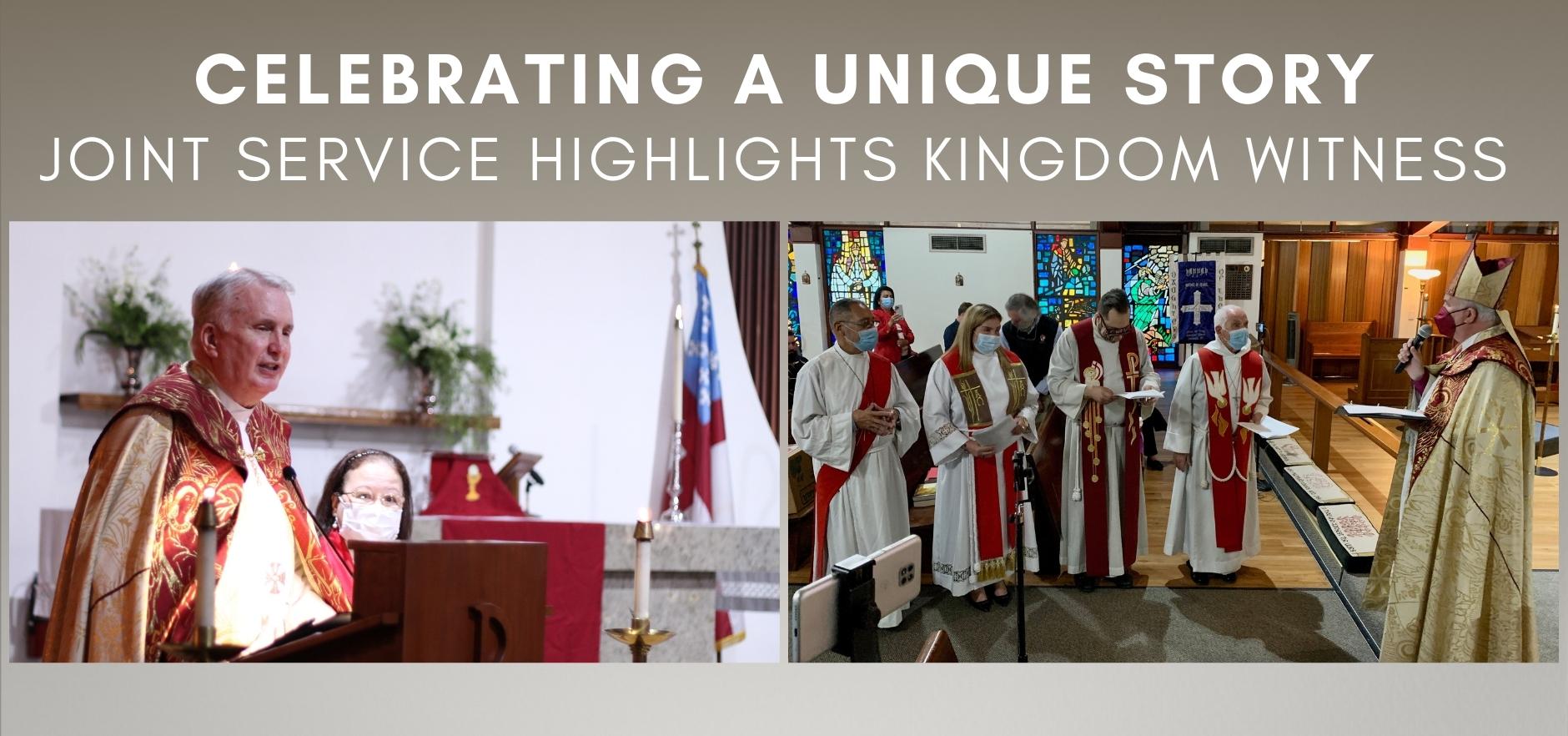The Celebration of New Ministry/Installation held at Christ the King and Jesús de Nazaret in the Azalea Park neighborhood of Orlando on the afternoon of Sunday, Feb. 6, told a unique story, one that points to both the people involved and the hearts behind the churches and their kingdom work. The service celebrated the merging of two pastoral teams: The Rev. Dr. Edward Weiss and The Rev. Dr. José Rodríguez as co-rectors of Christ the King and co-vicars of Jesús de Nazaret, The Rev. Maytee de la Torre as assistant rector of both churches and The Rev. Emilio Gonzalez as deacon of both churches.
“It’s what I consider a historic event,” said The Rt. Rev. Gregory O. Brewer, diocesan bishop, who presided over the service with translation from The Rev. Jacqueline Ponce, St. John’s, Kissimmee. He praised the two churches, which labor in unison but maintain their distinct witnesses, noting that Rodríguez and Weiss “work together so collegially” and adding that the tribute extends far past the co-rectors.
“For many congregations, this would not be their story,” Brewer said, describing what he said is a more typical chain of events: As a church’s Anglo members move away to other neighborhoods while the Hispanic population in its own neighborhood grows, no new Anglos join. The loyal Anglo members drive back to the church they love, but eventually, they grow too old to attend. The church shrinks and ends up being sold because it has too few members to continue, usually to a Hispanic congregation that sees explosive growth.
“I am thrilled that that is not the story here,” he said. “Instead, the leadership of these two congregations has said, ‘It is better for us to be together, for we have one mission, we serve one Lord, and God is teaching us how to love each other. So why would we leave our brothers and sisters?’
“We’re living into our faith,” Rodríguez said of the celebration and the heart behind it. “We’re living into our creed of one Lord, one faith, one baptism by uniting our pastoral teams.”
Although the two congregations remain distinct, “This isn’t a racial divide,” Rodríguez said. “This is a witness distinction. We are each proficient in an area, and the different identities come because of our proficiency in communicating the gospel.”
Through the process of merging the pastoral teams, Christ the King has rediscovered its heritage, he explained. As he studied the church archives, he learned that on one Sunday in the 1960s, Christ the King united with two other churches to raise approximately $2 million (adjusted for inflation) for poverty relief in Central Florida. But that wasn’t the only way the church participated in multicultural ministry.
“In the heart of the civil rights movement, while Central Florida was still in the process of desegregating, there were Black Haitian priests preaching in the pulpit of Christ the King, and the church was investing in health care ministries in the Caribbean,” Rodríguez said. “This church has always been different. And then in the ’60s as well, the church owned duplexes that it furnished and used to house newly arrived Cuban refugee families.”
Through the years, that history of outreach was all but forgotten, Rodríguez said. “But when I became vicar at Jesús de Nazaret and we started our outreach, it wasn’t anything new. This was already fertile ground. We didn’t know it, but the spirit that had inspired these previous acts of grace in our community was still very present, waiting to be accessed again. … The Hurricane Maria outreach, the earthquake outreach and now the COVID outreach … they’re just an extension of over five decades of outreach the church here has done before by English-speaking folks welcoming the stranger. And now, the stranger is being incorporated into the body locally,” he said.
For Harold “Hal” Williams, the only remaining founding member of Christ the King, that heritage has now come full circle. During the celebration service, he sat on the front pew with his daughter Laura Lee Brewer, the bishop’s wife.
The churches’ choice to embrace their heritage and unite their pastoral teams has nothing to do with saving money or eliminating staff, Rodríguez noted. “In the economy of most Episcopal churches, you bring churches together to cut costs. In God’s economy, you bring churches together for synergy.
“Three priests and one deacon entered the church, and three priests and one deacon left the church,” he said. “Two congregations entered the church, and both of them left, united in purpose, united as one. Both of them left enriched; both of them walked out having a full team that they’ve never had before. And both congregations are benefiting from this coming together.”

